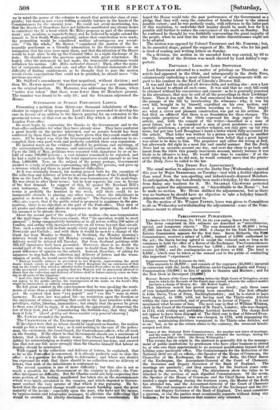PARLIAMENTARY .PUBLICATIONS.
Estimates for Civil Services, No. VII. for the yeas ending March 31st 1851. - The items comprised. in this estimate are described as "miscellaneous, special, and temporary objects." - The sum demanded is 88,4631. ; being 37,1091. less than the estimate for 1849. A charge for the Irish Encumbered Estates Commission appears for the first time. Baron Richards,' the it Commissioner, receives a salary of 1,5001., instead of 3,0001. authorised by the act; the Baron having agreed to accept the reduced sum so long as h.e continues to hold the office of a Baron of the Exchequer. Two Commissioners receive 2,0001. each; the Secretary has 1,0001.; clerks and other persons .receive 2,1001.; and the contingencies are put down at 2501. The total is 8,8501. ; which may be taken as the annual cost to the public of conducting this important " experiment."
Supplementary Naval Estimate for 1851. - •
This amounts to 58,929/. ; and consists of the expenses (33,9291.) ineurted in connexion with the Arctic Expeditions under Captains Austin and Penny ; Compensation (10,000/.) in lieu of spirits to. Seamen and Marines ; and for the New Dock at Devonport (15,0001.)
Heresy: Return of the Cases depending before the High Court of Delegates, at any. time to which the Records of the Court may extend, wherein the subject-matter has been a charge of Heresy, he. (Sir Robert Inglis.) This laborious search has proved meagre in result ; only three cases of very insignificant character having been unearthed. The first offender is John Davis, Vicar of Penn, Buckinghamshire ; and he is stated to have, been charged, in 1690, with not having read the Thirty-nine Articles within the time prescribed, and of preaching in favour of Popery. It is not mentioned what became of him. The next ease is that of William Whiston, clerk in the Court of the Commissary of St. Paul's, London ; who was charged, in 1712, with writing and publishing heretical doctrines. The charge does not appear to have been disposed of. The third case is that of Edward Evan7 son, Vicar of Tewkesbury ; who was charged, in 1775, with impugning the Liturgy, maintaining doctrines repugnant to the Thirty -nine Articles, and so on : 'but, so far as the return -states to the contrary, the reverend heretic escaped scot free.
Names of the National Debt Commissioners, the number and dates of meetings, and the names of the Commissioners who attended the meetings, during the period from 1832 to 1845. (Sir Henry. Willoughby.) This return has its origin in the mistrust 80 generally felt in the manage- ment of public institutions by gentlemen who have other business to attend to, or who owe their appointment to no personal qualification beyond that of holding some particular office. The Commissioners for the Reduction of the National Debt are all ex officio,—the Speaker of the House of Commons, the Chancellor of the Exchequer, the Master of the Rolls, the Chief Baron of the Exchequer, the Accountant-General of the Court of Chancery, the Governor and Deputy Governor of the Bank of England. The meetings are quarterly ; and they amount, for the fourteen years com- prised in the return, to fifty-six. The attendances show the value to be attached to the services of such dignified Commissioners. Of the seven, the Spmker of the House of Commons and the Chief Baron have not at- tended a single meeting during the fourteen y the Master of the Rolls has attended ten, and the Accountant-General of the Court of Chancery three. The real managers are the Chancellor of the Exchequer and the Go- vernor and Deputy Governor of the Bank of England. Two must constitute a quorum, or else the parties must occasionally separate without doing any busman ;, for in three instances that number only attended.


























 Previous page
Previous page